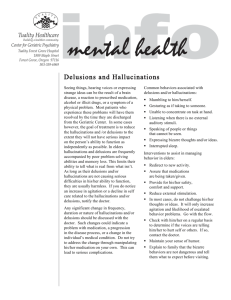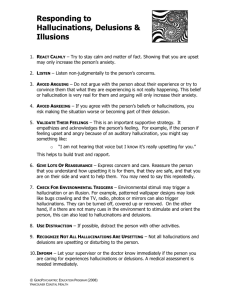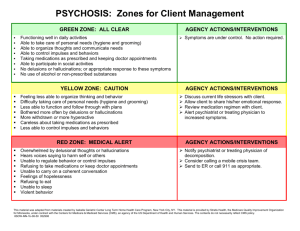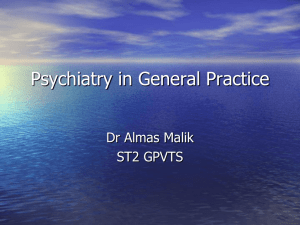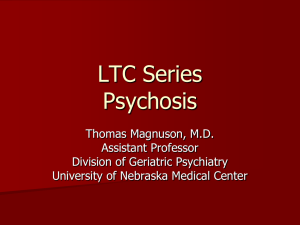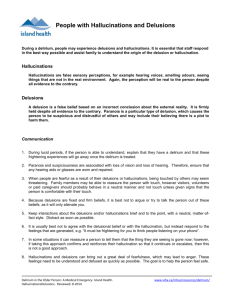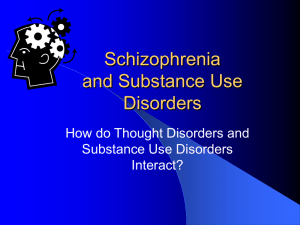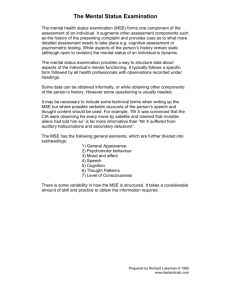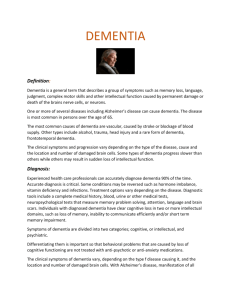What is Psychosis? Hallucinations Delusions
advertisement
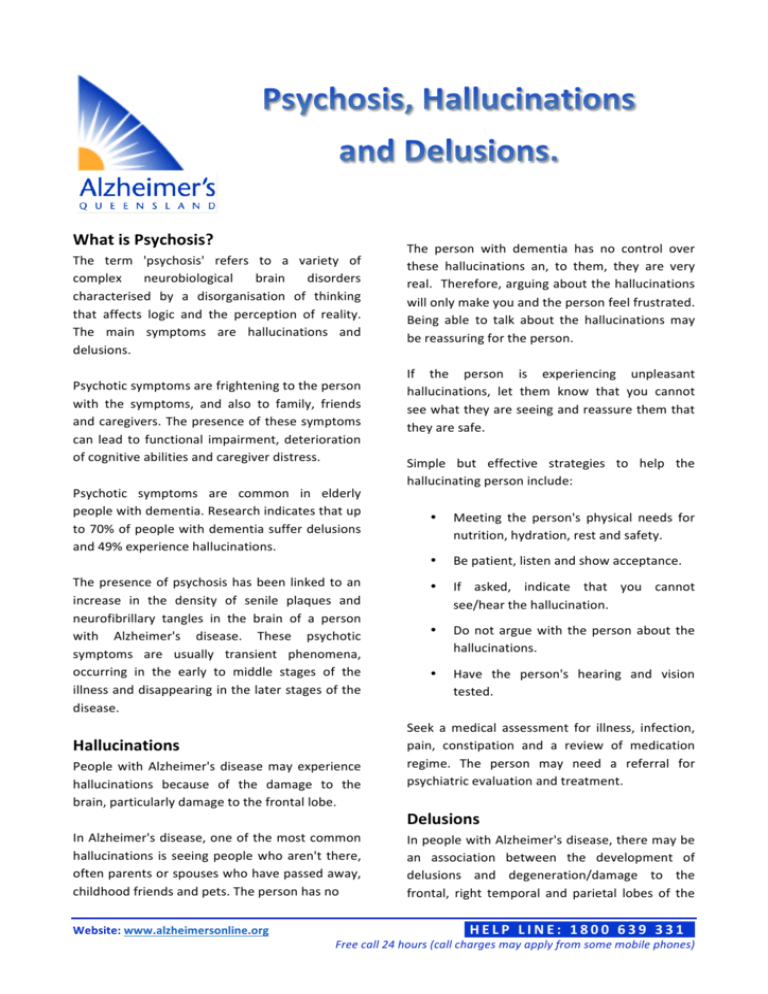
What is Psychosis? The term 'psychosis' refers to a variety of complex neurobiological brain disorders characterised by a disorganisation of thinking that affects logic and the perception of reality. The main symptoms are hallucinations and delusions. Psychotic symptoms are frightening to the person with the symptoms, and also to family, friends and caregivers. The presence of these symptoms can lead to functional impairment, deterioration of cognitive abilities and caregiver distress. Psychotic symptoms are common in elderly people with dementia. Research indicates that up to 70% of people with dementia suffer delusions and 49% experience hallucinations. The presence of psychosis has been linked to an increase in the density of senile plaques and neurofibrillary tangles in the brain of a person with Alzheimer's disease. These psychotic symptoms are usually transient phenomena, occurring in the early to middle stages of the illness and disappearing in the later stages of the disease. Hallucinations People with Alzheimer's disease may experience hallucinations because of the damage to the brain, particularly damage to the frontal lobe. In Alzheimer's disease, one of the most common hallucinations is seeing people who aren't there, often parents or spouses who have passed away, childhood friends and pets. The person has no The person with dementia has no control over these hallucinations an, to them, they are very real. Therefore, arguing about the hallucinations will only make you and the person feel frustrated. Being able to talk about the hallucinations may be reassuring for the person. If the person is experiencing unpleasant hallucinations, let them know that you cannot see what they are seeing and reassure them that they are safe. Simple but effective strategies to help the hallucinating person include: • Meeting the person's physical needs for nutrition, hydration, rest and safety. • Be patient, listen and show acceptance. • If asked, indicate that you cannot see/hear the hallucination. • Do not argue with the person about the hallucinations. • Have the person's hearing and vision tested. Seek a medical assessment for illness, infection, pain, constipation and a review of medication regime. The person may need a referral for psychiatric evaluation and treatment. Delusions In people with Alzheimer's disease, there may be an association between the development of delusions and degeneration/damage to the frontal, right temporal and parietal lobes of the Website: www.alzheimersonline.org H E L P L I N E : 1 8 0 0 6 3 9 3 3 1 Free call 24 hours (call charges may apply from some mobile phones) brain. These delusions are most commonly caused by paranoia and usually relate to ideas of theft, abandonment or infidelity. Simple delusions of theft can represent an attempt by the person to explain the loss of articles that have been misplaced. Unable to remember losing the object, the person with dementia believes it has been taken by someone close, often a caregiver. The person may also experience persecutory delusions that people are after them, delusions of spouse infidelity or delusions of abandonment. Delusional ideas are often distressing and have been associated with agitation or aggression in persons with dementia. To the person with delusions, they are very real. Do not try to convince the person with dementia that their ideas are imaginary. This almost never works and will only cause frustration. Be aware of your own feelings towards the person. The person's loss of reality and associated behaviour can be distressing and frustrating for the caregiver. Hints for dealing with the delusional elderly person: • Meet the client's physical needs for nutrition, hydration, rest and safety. • Investigate any problem that may be true. The person may well be the victim of theft. • Look for lost items, let the person know where they have left it or where their valuables have been stored. • Do not argue. Listen and acknowledge the feelings attached to the delusion. The person may be afraid or sad. • Don't take the accusations personally; the person with dementia has no control over these ideas. • Seek a medical assessment to rule out any medical conditions that may be causing the delusional ideas. If hallucinations and delusions are occurring regularly and are resulting in serious behaviours which do not match the personality of temperament of the person with dementia, the person may need to be referred for medical or psychiatric evaluation and treatment. Help and assistance is available. For further information please contact Alzheimer’s Queensland through the Dementia Help Line on: 1800 639 331 Website: www.alzheimersonline.org H E L P L I N E : 1 8 0 0 6 3 9 3 3 1 Free call 24 hours (call charges may apply from some mobile phones)
